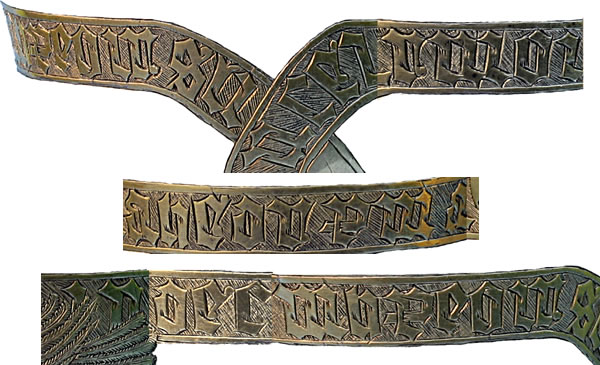A quick question for you from a visitor to Omniglot:
Does anyone know the meaning of the Xhosa phrase “Sponono yekile”?
It’s the title of a song, which you can hear on this page.
I searched for it in an online Xhosa dictionary without success.
A quick question for you from a visitor to Omniglot:
Does anyone know the meaning of the Xhosa phrase “Sponono yekile”?
It’s the title of a song, which you can hear on this page.
I searched for it in an online Xhosa dictionary without success.
I don’t have a quiz for you today, but do have a question from a correspondent:
Can any of you provide a good English version of the following?
Recht haben und Recht bekommen sind zwei verschiedene Dinge.
This would be used in a context of somebody who loses or fears losing in a court of justice in spite of having a very strong legal case. Typically your lawyer could say this to you, when discussing the case.

Can any of you decipher the Chinese in this image?
The larger characters appear to be “仙露明珠方 朗潤松風水月北” (xiān lù míng zhū fāng lǎng rùn sōng fēng shuǐ yuè běi).
The smaller characters on the left appear to be “??扵甾香饭石生?” (??zāi xiāng fàn dàn shēng ?) – I’m not sure about the first two or the last one.
I know what parts of it mean, but not the whole thing.
[Update 21/11/2010]: according to a friend or a friend, the characters are “仙露明珠方明润,松风明月比清华。 于留香馆,石生画。” This is from 《小窗幽记》 (xiăochuāng yōujì) in 《醉古堂剑扫》 (zuì gŭ táng jiàn săo), Volume 12, Paragraph 121.
These images were sent in by a visitor to Omniglot from Romania and appear on a Romanian cup dating from about 1500. The inscription is in Gothic-style letters, but has so far resisted decipherment and may be encrypted or in another language such as Arabic or Romani.

Close up of the inscription

Any suggestions?-style
Can anyone decipher the writing around this disc?

It was sent in by a visitor to Omniglot who’s been told that it’s in a Kufic version of the Arabic script, and who thinks it could be Ottoman Turkish or Persian.
A speaker of Hmong who wrote to me recently mentioned that consonants are called tsiaj ntawv txiv (the father letters) and vowels are called tsiaj ntawv niam (the mother letters) in Hmong, and would like to know whether any other languages have similar names for consonants and vowels.